Ghana's
culture is rich, diverse, and deeply rooted in its history, traditions, and heritage. Here
are some key aspects of Ghana's culture:
 Traditional Clothing and Attire:
Ghanaian traditional clothing is colorful and symbolic. The Kente cloth, with its vibrant
patterns and colors, is perhaps the most iconic. It is handwoven and worn during important
ceremonies and events. The smock, worn in the northern regions, is another significant attire,
known for its unique embroidery.
Traditional Clothing and Attire:
Ghanaian traditional clothing is colorful and symbolic. The Kente cloth, with its vibrant
patterns and colors, is perhaps the most iconic. It is handwoven and worn during important
ceremonies and events. The smock, worn in the northern regions, is another significant attire,
known for its unique embroidery.
 Language and Literature:
Ghana is home to over 80 languages, with Akan (Twi and Fante), Ewe, and Ga being among the most
widely spoken. English is the official language. Ghanaian literature includes the works of
renowned authors such as Ayi Kwei Armah and Ama Ata Aidoo, who explore themes of identity,
colonialism, and social change. Oral literature, including folktales and proverbs, plays a
crucial role in preserving Ghanaian culture.
Language and Literature:
Ghana is home to over 80 languages, with Akan (Twi and Fante), Ewe, and Ga being among the most
widely spoken. English is the official language. Ghanaian literature includes the works of
renowned authors such as Ayi Kwei Armah and Ama Ata Aidoo, who explore themes of identity,
colonialism, and social change. Oral literature, including folktales and proverbs, plays a
crucial role in preserving Ghanaian culture.
 Music and Dance:
Music and dance are integral to Ghanaian culture. Traditional music features drums like the
talking drum and instruments such as the xylophone and kora. Highlife and Hiplife are popular
music genres that blend traditional sounds with contemporary influences. Dance forms like Adowa,
Kpanlogo, and Azonto are performed during festivals, ceremonies, and social gatherings.
Music and Dance:
Music and dance are integral to Ghanaian culture. Traditional music features drums like the
talking drum and instruments such as the xylophone and kora. Highlife and Hiplife are popular
music genres that blend traditional sounds with contemporary influences. Dance forms like Adowa,
Kpanlogo, and Azonto are performed during festivals, ceremonies, and social gatherings.
 Ceremonies and Festivals:
Ghanaian ceremonies and festivals are vibrant and full of cultural significance. Festivals like
Homowo in Ga, Aboakyer in Winneba, and Hogbetsotso in Ewe celebrate historical events, harvests,
and community spirits. Traditional ceremonies, including naming, marriage, and funerals, are
conducted with elaborate rituals and customs, reflecting the deep cultural heritage of the
people.
Ceremonies and Festivals:
Ghanaian ceremonies and festivals are vibrant and full of cultural significance. Festivals like
Homowo in Ga, Aboakyer in Winneba, and Hogbetsotso in Ewe celebrate historical events, harvests,
and community spirits. Traditional ceremonies, including naming, marriage, and funerals, are
conducted with elaborate rituals and customs, reflecting the deep cultural heritage of the
people.
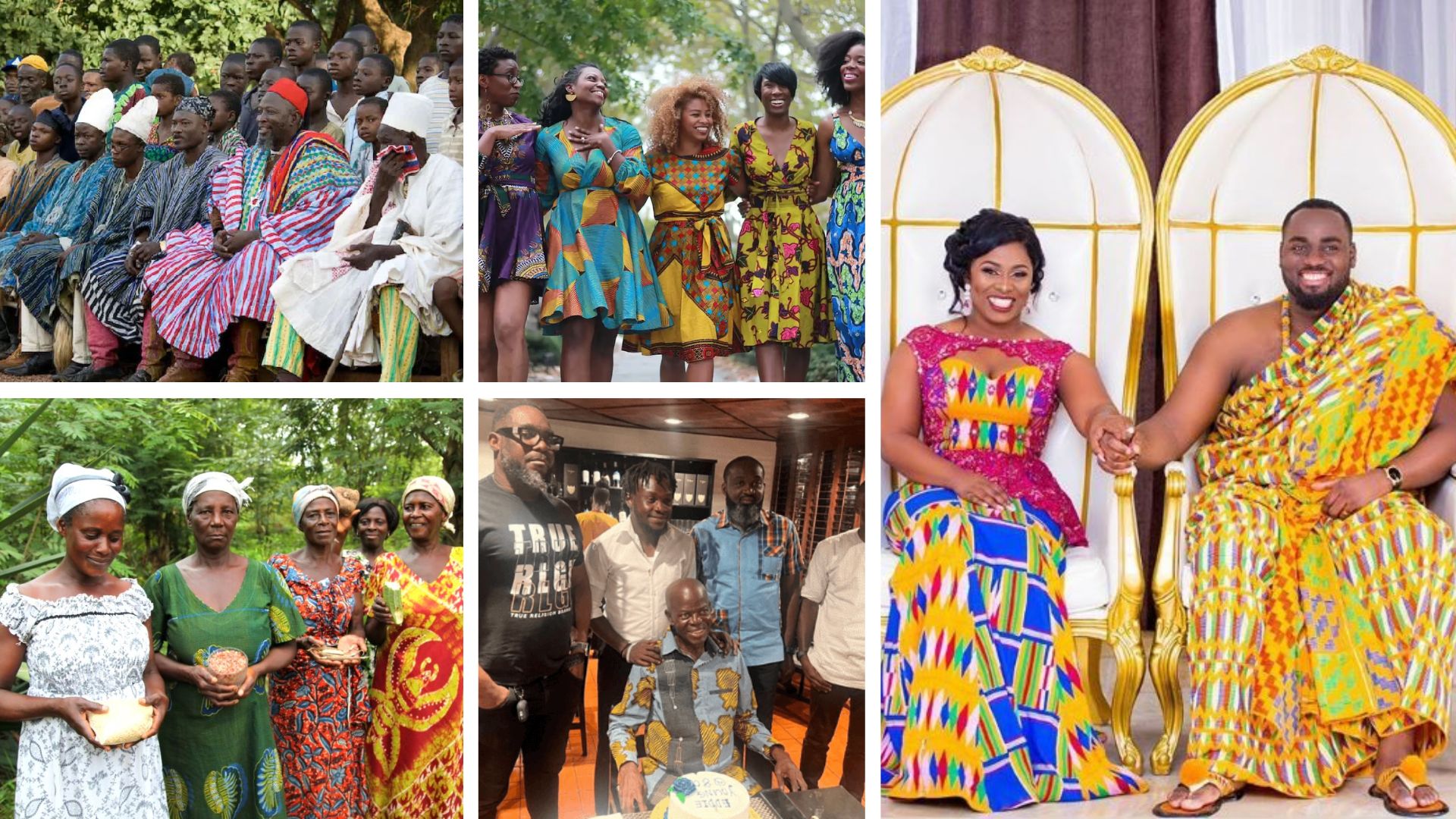
Ghana Clothing
Women:
Ghanaian women often wear colorful Kente cloth, which is handwoven and symbolizes heritage
and status. They also wear traditional dresses called "Kaba" and "Slit," often paired with
headwraps.
Men: Men typically wear a "Dashiki" or "Batakari," a smock with unique embroidery. For
special occasions, men might drape themselves in Kente cloth.
Traditional Wedding: At Ghanaian weddings, the bride and groom wear matching Kente
outfits, reflecting their unity and cultural pride. The intricate designs and bright colors of
Kente make these ceremonies vibrant and memorable.
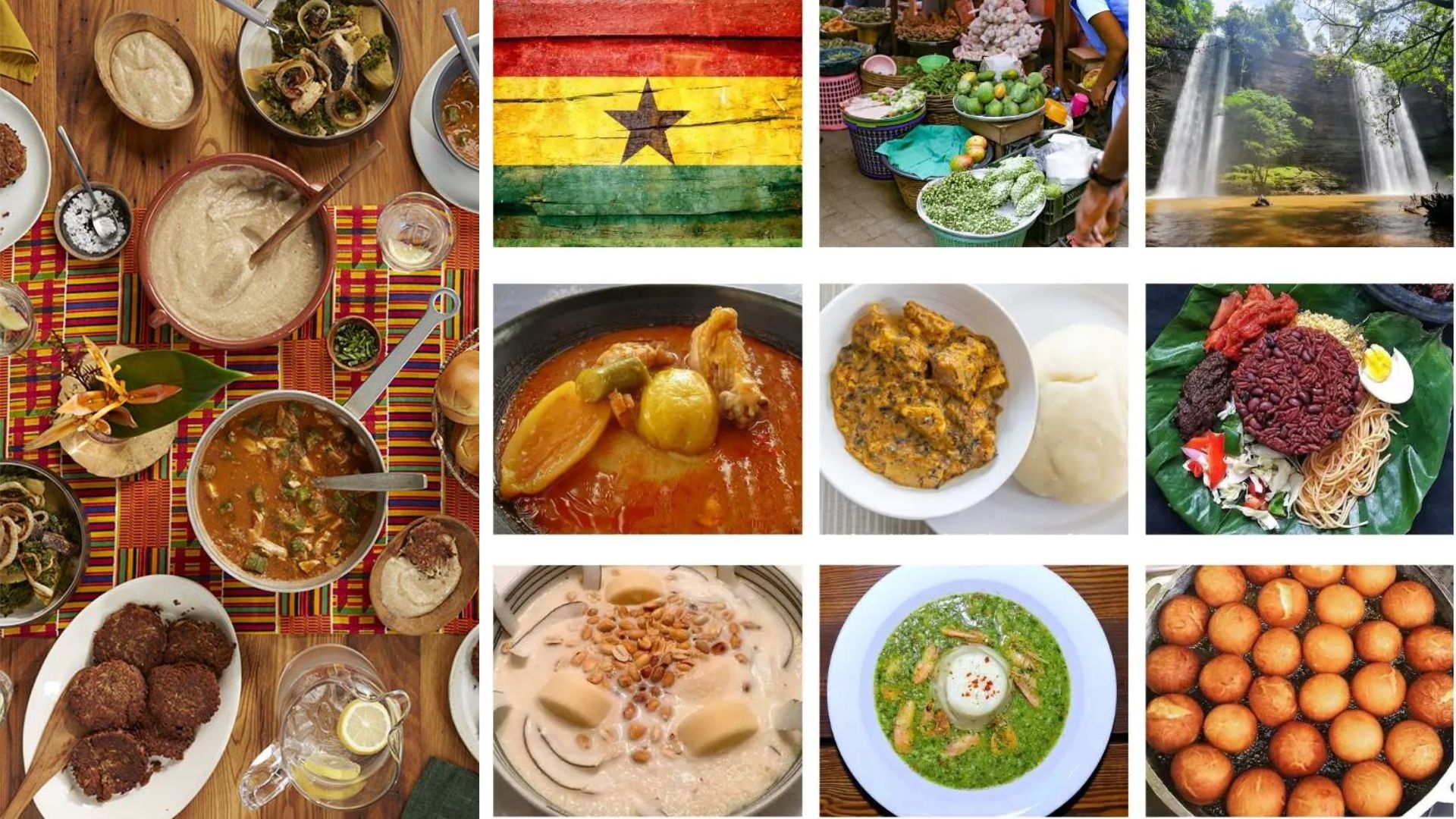
Ghana Food
Ghanaian cuisine is diverse and flavorful, reflecting the country’s rich cultural heritage. Popular dishes include jollof rice, a spicy rice dish cooked with tomatoes and seasonings, and banku, a fermented corn and cassava dough served with soup or stew. Fufu, made from pounded yam, cassava, or plantain, is commonly paired with light soup, groundnut soup, or palm nut soup. Street foods like kebabs, kakro (fried plantain balls), and waakye (rice and beans) are also widely enjoyed.
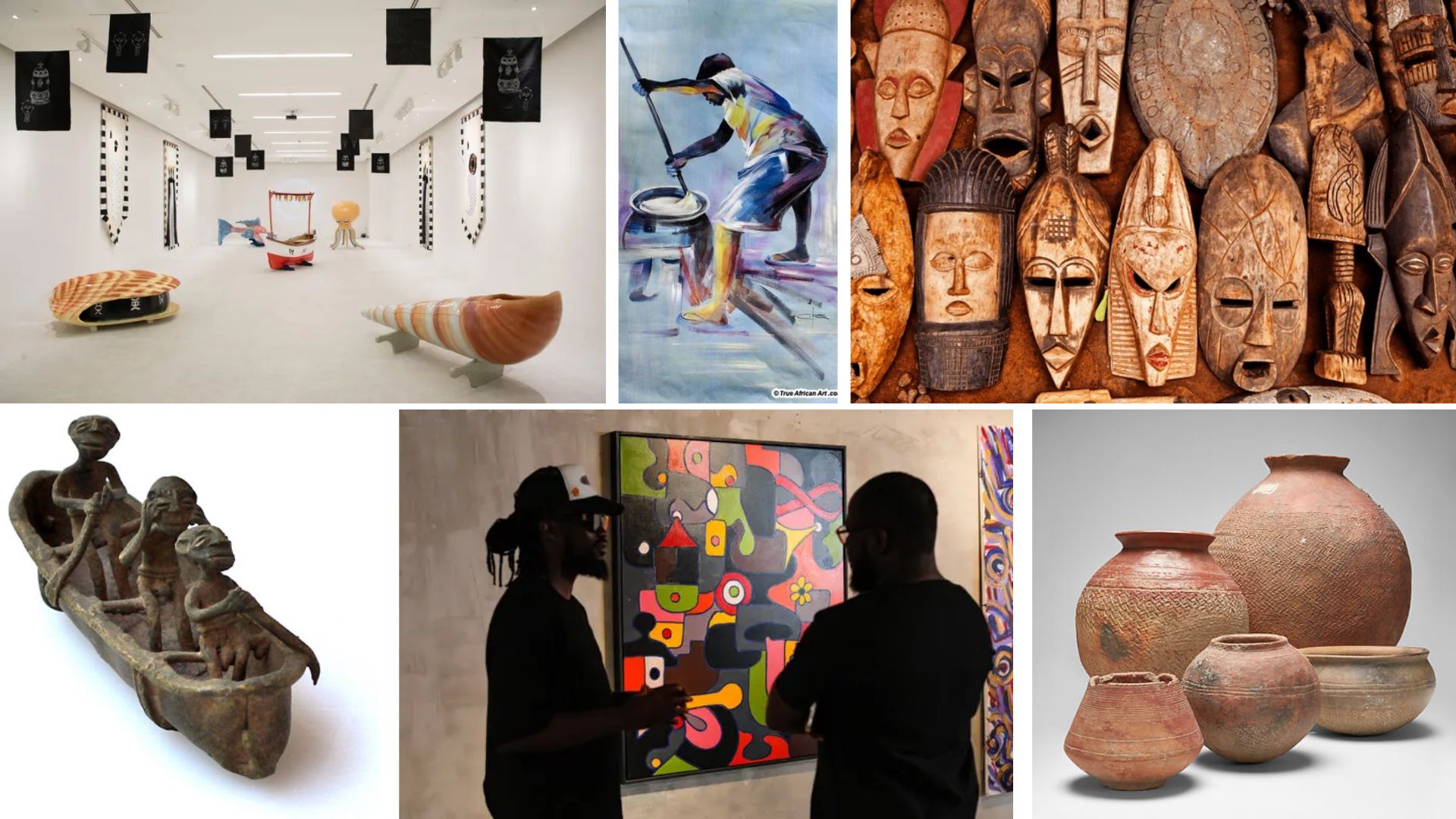
Ghana Arts and Crafts
Ghana boasts a rich tradition of arts and crafts, reflecting its cultural heritage and history. Skilled artisans create beautiful Kente cloth, known for its vibrant patterns and symbolic meanings. Wood carving is another prominent craft, producing intricate stools, masks, and figurines that often depict traditional beliefs and stories. Beadwork is also significant, with beads used in jewelry and ceremonial attire. Pottery and basket weaving are widespread, showcasing both functionality and artistic expression. These crafts are not only cultural treasures but also support local economies and preserve ancestral skills.
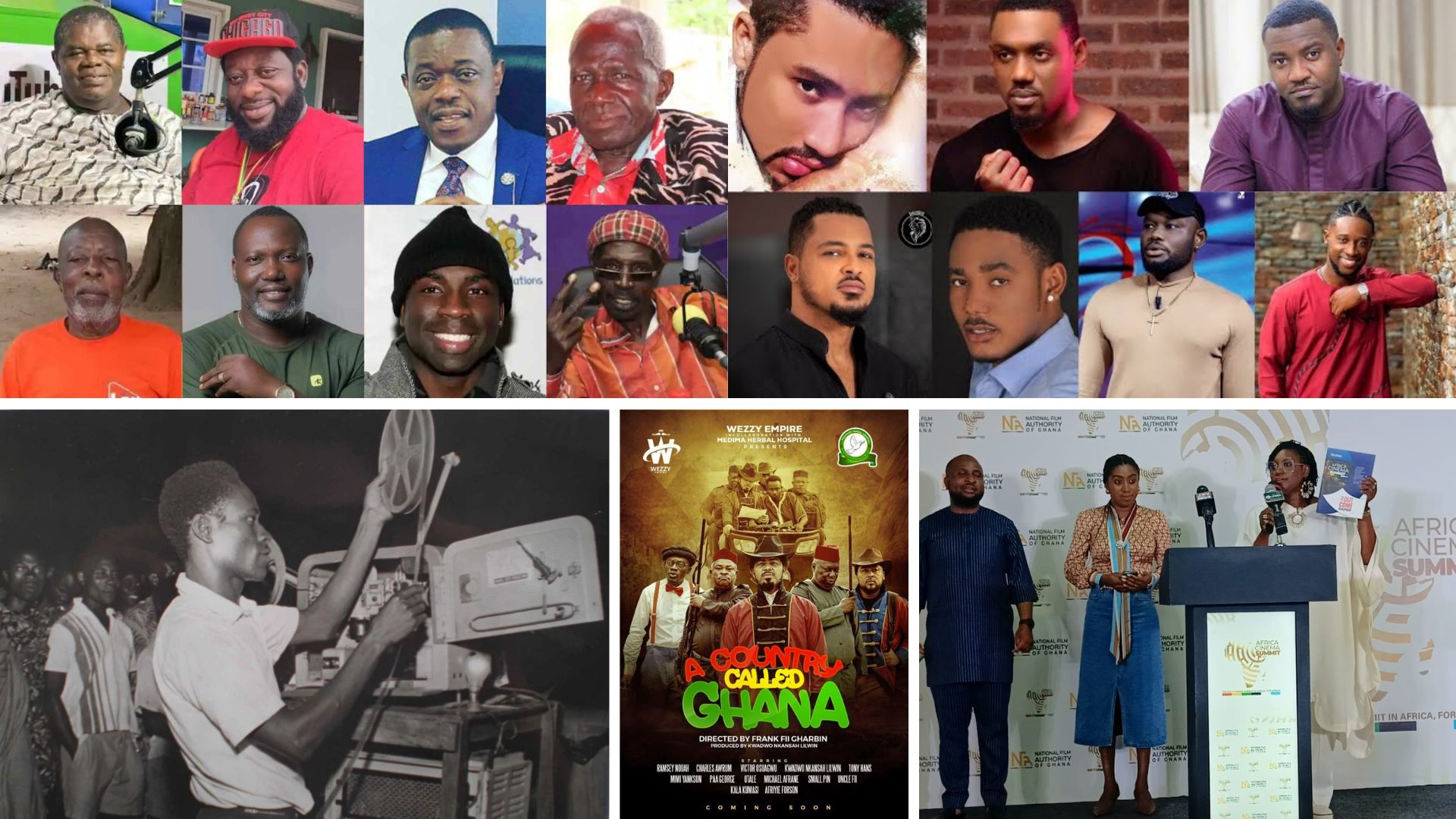
Ghana Film Industry
Ghana's film industry, also known as Ghallywood, began in the early 1950s with the establishment of the Gold Coast Film Unit. The industry flourished in the 1980s and 1990s, producing notable films like "I Told You So" and "Kukurantumi." Today, Ghana's film industry is vibrant, with filmmakers exploring diverse genres and themes. Notable contemporary films include "Beasts of No Nation" and "The Burial of Kojo." The industry faces challenges such as funding and distribution but continues to grow, with increasing recognition at international film festivals. Digital platforms and streaming services are expanding access to Ghanaian films globally.
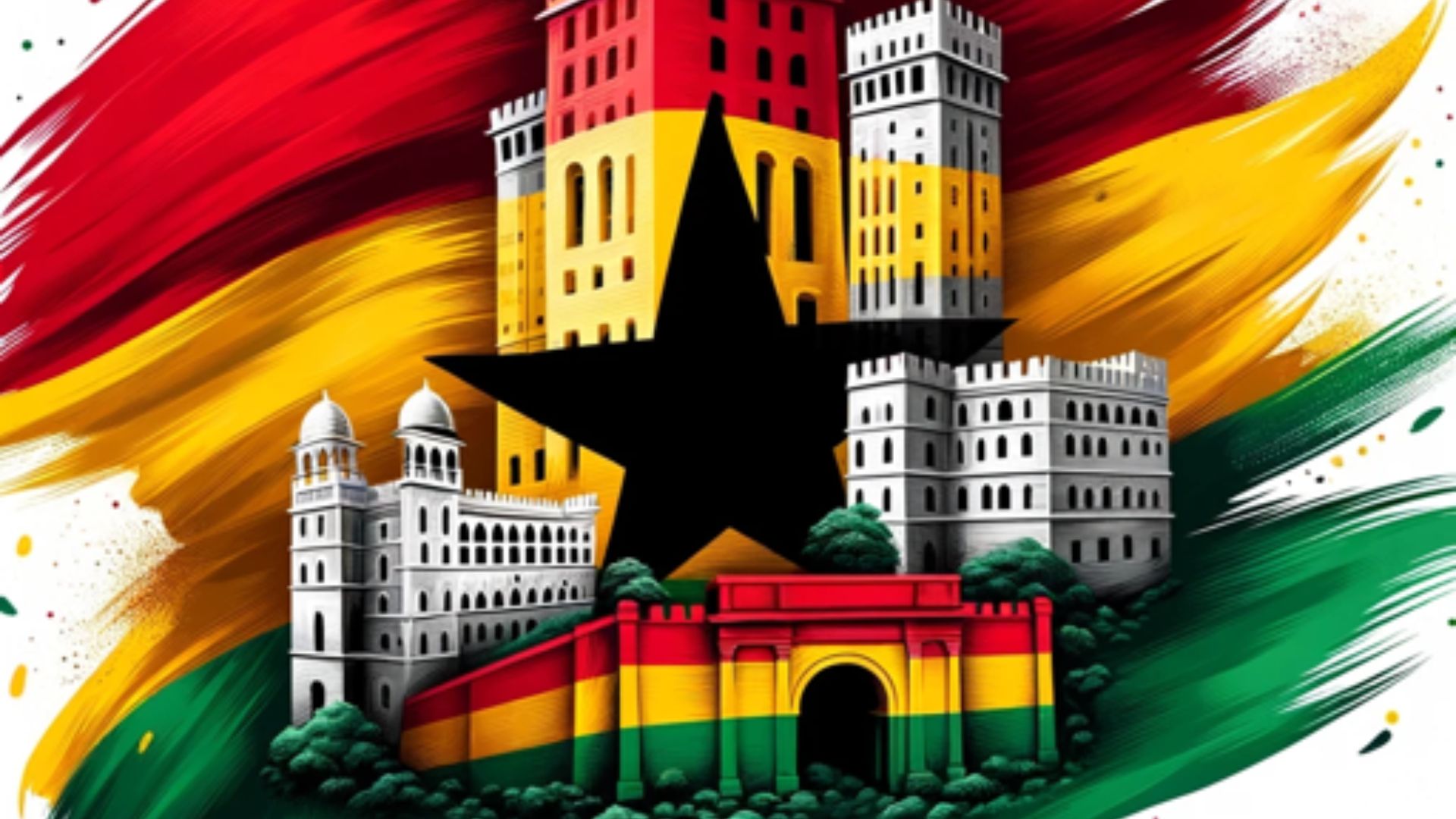
Ghana Economy
Ghana's economy is poised for continued growth, driven by diverse sectors including
agriculture, mining, and services. The government focuses on enhancing infrastructure, boosting
agricultural productivity, and attracting foreign investment. Key exports like gold, cocoa, and
oil remain vital, while tourism and technology sectors show promising expansion. Economic
reforms aim to stabilize the macroeconomic environment, reduce inflation, and improve fiscal
discipline. The implementation of the African Continental Free Trade Area (AfCFTA) provides new
opportunities for trade and investment. Overall, Ghana's economic outlook for 2024 is
optimistic, emphasizing sustainable growth and development.
Textile and Garment Industry, Mining, Telecommunications
Tourism, Financial Services, Manufacturing, Agriculture, Renewable Energy.